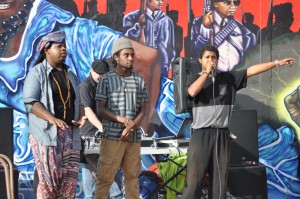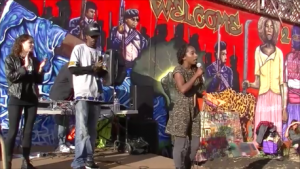
Radical group Qilombo and the community decided to fight their most recent issue with gentrification through the Afrika Town Anti-Gentrification Block Party on Nov. 8.
Known for its activism against gentrification and displacement of people of color in West Oakland, Qilombo was threatened to leave their community center. Oaklandd landlord and founder of Sullivan Management Company (SMC) Neill Sullivan sent the group a 30 day eviction notice on Oct. 15. After receiving the notice, Qilombo worked to spread the news to community members and media outlets, as well as place time into creating the block party.
Qilombo organizers Van Dell and Chaga Kwa Nia welcomed its guests by introducing the history and mission statement of the group through the etymology of the group’s name. According to Dell, their name derived from the Kimbuntu word kilombo referring to 19th century Brazilian refuges and settlements for escaped and indentured slaves.
“We see Qilombo as a real means for us to be a refuge from the ongoing colonialism, a refuge from the ongoing gentrification, a free public space that does not exist in Oakland right now,” Dell said.
The block party had local performers and musical acts such as hip hop and R&B group Tatu Vision, R&B singer Ka’ra and DJ Destiny. Along with the performances, there were vendors selling jewelry and medicines, as well as yoga and tai chi workshops for the community. Volunteers also made and sold pizza using Afrika Town’s clay oven in the community garden.
The block party also held a panel for participants that have fought against gentrification in different ways. The panelists included Dell, Kwa Nia, and Robbie Clark of the Causa Justa: Just Cause organization, Quinton Sankofa of Movement Generation Justice and Ecology Project, Juan of Station 40 and Anthony Sul of the group Idle No More.

Each panelist spoke on the different causes and effects from gentrification as well as what needs to be done in the fight. When asked about moving from gentrification and capitalism, Sankofa stressed the significance of physical and mental decolonization for Black and Brown people.
“What we’re talking about is an ongoing process, and I think that one of the things that we must do is that we must push for a decolonization of our minds […] the healing of ourselves.” Sankofa said.
Sul continued the conversation by focusing on communal help and self-reliance away from mainstream corporations. As a member of the Ohlone tribe (Native American people of Central and Northern California), he spoke about people’s investments into their communities.
“Invest into the community, invest into the people growing food, invest into the artists, invest into the music,” Sul said. “It’s about us coming together communally and coming up.”
After the panel, Dell and Kwa Nia announced that after calls and concerns from the Oakland community, Neill Sullivan gave Qilombo a one year lease to stay in the neighborhood. Dell and Kwa Nia stressed the importance of fighting and activism for their win, especially from the community.
“Something that happened was that we fought like hell,” Dell said. “We told [SMC] that we are not going anywhere, we are not moving.”
Kwa Nia also focused on importance of longevity for Qilombo during the announcement. As an original founder and member of Qilombo, he saw the victory as a success for the present and the future.
“We want to make sure that this goes good,” Kwa Nia said. “We want for this for eternity […] for the long haul.”




